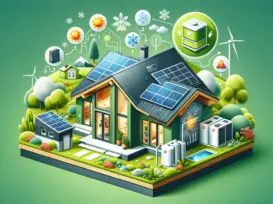Grus Home Energy - Green Technology
Exploring the Advancements and Potential of Green Technology for a Sustainable Future
Exploring the Advancements and Potential of Green Technology for a Sustainable Future
In recent years, green technology has become a cornerstone in the quest for a sustainable future. As the world grapples with climate change, exhaustible resource depletion, and increasing environmental concerns, the need for innovative solutions that minimize environmental impact has never been more critical. Green technology, also known as clean technology or sustainable technology, encompasses a rapidly growing set of methods and materials, from energy generation to non-toxic cleaning products, which are designed to mitigate or reverse the effects of human activity on the environment.
The advancements in green technology are diverse and dynamic, addressing various aspects of environmental conservation and resource efficiency. Renewable energy sources, such as solar, wind, hydro, and geothermal power, are at the forefront of green technology. They provide cleaner alternatives to fossil fuels, which are the primary contributors to greenhouse gas emissions and global warming. Innovations in solar panel and wind turbine design have led to reductions in cost and improvements in efficiency, making these technologies more accessible to both developed and developing countries.
One exciting development in green technology is the field of energy storage. As renewable energy sources are inherently intermittent, advancements in battery technologies, such as lithium-ion and solid-state batteries, have made it possible to store energy for use when the sun isn’t shining or the wind isn’t blowing. This has the potential to stabilize the grid and ensure a steady supply of green energy.
In the realm of transportation, electric vehicles (EVs) have emerged as a green technology game-changer. With zero tailpipe emissions, EVs offer a cleaner alternative to traditional internal combustion engine vehicles. The development of more efficient and longer-lasting batteries has made EVs more practical for the average consumer. Additionally, the growth of the EV market has spurred the expansion of charging infrastructure, further accelerating the adoption of this green technology.
Water conservation and purification technologies also play a critical role in green technology. Innovations like low-flow fixtures, rainwater harvesting systems, and advanced filtration methods reduce water consumption and ensure that clean water is available even in areas with limited resources. These technologies not only help to preserve our most vital natural resource but also reduce the energy required for water treatment and distribution.
Green buildings are another significant aspect of sustainable technology. These structures are designed to reduce the overall impact of the built environment on human health and the natural world. They incorporate energy-efficient windows, eco-friendly insulation, green roofs, and smart building systems that automate lighting, heating, and cooling to reduce energy consumption. Green buildings not only conserve resources but also provide healthier living and working environments for occupants.
Agriculture, which is responsible for a substantial portion of greenhouse gas emissions, has also benefited from green technology. Precision farming techniques that utilize drones and IoT sensors allow for more efficient use of water, fertilizers, and pesticides, leading to higher crop yields with less environmental impact. Additionally, advances in biotechnology have enabled the development of crops that are more resistant to pests and diseases, reducing the need for chemical interventions.
The integration of green technology into daily life is increasingly facilitated by the Internet of Things (IoT), which interconnects devices and systems for smarter resource management. From smart meters that optimize electricity use to apps that monitor personal carbon footprints, the IoT is making it easier for individuals and businesses to contribute to sustainability.
In conclusion, the potential of green technology to revolutionize our world is immense. Whether it’s through cleaner energy, sustainable transportation, water conservation, green buildings, or smarter agriculture, these innovations offer hope for a more sustainable future. As technology continues to evolve, it’s imperative that individuals, businesses, and governments support the development and adoption of green technologies to protect and preserve our planet for future generations.
©2025 All Rights Reserved. Grus IoT Co.,Ltd.
